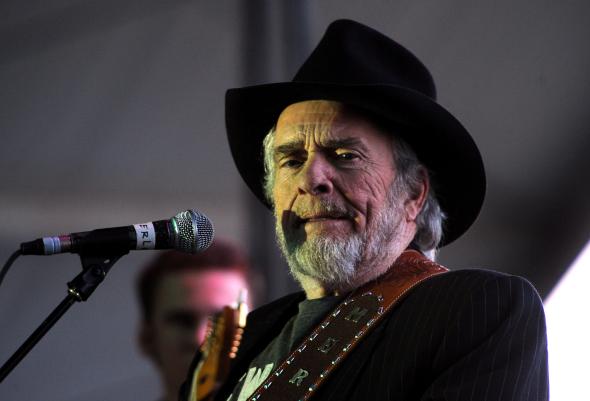Where Do I Start With Merle Haggard?

Photo by Frazer Harrison/Getty Images
Last week, we excerpted a new book by Brow Beat contributor David Cantwell, Merle Haggard: The Running Kind. We asked him to pick the essential tracks for those new to Haggard’s music, which you’ll find in a Spotify playlist below. We’ve also provided links to the songs on YouTube and Amazon.
Merle Haggard has scored nearly 40 No. 1 country hits over the past half century. He made the cover of Time back in 1974 and a few years ago became a Kennedy Center Honoree. Still, many people know Haggard primarily for “Okie from Muskogee,” a single, ideologically loaded shotgun blast of what, from here in the 21st century, we can recognize as a heartland rehearsal of identity politics—an early return of fire in what we now call “the culture war.”
“Okie” was an important record, and a ridiculously catchy one as well, but it doesn’t even begin to suggest the emotional depths and artistic range of the Hag’s artistry. Where to start?
For the playlist below, I’ve deliberately passed on “Okie” as I assume most folks have already heard it (and because we went over it pretty extensively last week). That caveat aside, here’s a baker’s dozen of Haggard cuts from across the Country Music Hall of Famer’s career. I’ve focused on selections that are, to my ears, representative of his finest music. I hope they’ll encourage people to delve even deeper into what I’ve come to believe is one of the greatest bodies of work any American artist has yet produced.
The best of Haggard’s early singles—recorded for the tiny Tally record label in Bakersfield, California—is this perfect little country duet, in which Merle trades lines with his one-time wife and longtime harmony singer, the great Bonnie Owens.
2. “Swinging Doors” (1966)
An early hit from near the beginning of his long tenure at Capitol Records, “Swinging Doors” is an exemplar of country’s 1960s honky-tonk revival.
3. “Mama Tried” (1968)
An autobiographical gem, except for that one truth-stretcher up front that has the Hag doing “life without parole.” Grateful Dead covered this one at Woodstock.
4. “Sing Me Back Home” (1968)
Haggard’s great humanist anthem offers us a prisoner condemned to die and looking for a song that can set him free.
5. “Hungry Eyes” (1969)
6. “Workin’ Man Blues” (1969)
These two show the Poet of the Common Man at his contemplative and his rocking best, respectively. “Hungry Eyes” is like the musical equivalent of Dorothea Lange’s famous photo, “Migrant Mother.” And if the driving rhythm track here on “Workin’ Man Blues” sounds like late-era Elvis Presley, that’s because it is. Not long after this was recorded, Fender guitar ace James Burton left Haggard’s regular studio line-up to lead the King’s TCB Band—and he took this rhythm with him.
7. “Silver Wings” (1969)
The 1969 studio recording is just a gorgeous pop record: loss at its loveliest.
Merle’s biggest crossover pop hit is this amazing anti-Christmas song. How can you give your kids a Merry Christmas when you just got “laid off down at the factory”?
9. “The Running Kind” (1978)
A definitive statement of the always freedom-seeking Haggard’s rough-and-rowdy ways (and the title track, as it were, to my book). Merle: “Every front door found me hopin’/ That I’d find the backdoor open.”
10. “Footlights” (1979)
In which a bone-weary Merle has to put on his old Inst-o-matic grin and go out and do another show. Haggard’s a huge star and succesful artist but he still hates his job just like most of the rest of us.
11. “Natural High” (1985)
With backing vocals from Janie Fricke, Merle creates a sexy, steamy, seductive country version of R&B’s Quiet Storm.
12. “Kern River” (1985)
The flip-side of Reagan-era optimism are resigned, terrifying records like this one.
13. “If I Could Only Fly” (2000)
The great country outlaw, bandleader, songwriter and icon is also an absolutely heartbreaking ballad singer. My pick for the best recording of Haggard’s remarkable 21st-century “comeback."
Previously in Where Do I Start With:
Benjamin Britten
Brad Paisley
Justin Bieber
The Beach Boys
The Magnetic Fields
Fleetwood Mac
Richard Thompson
